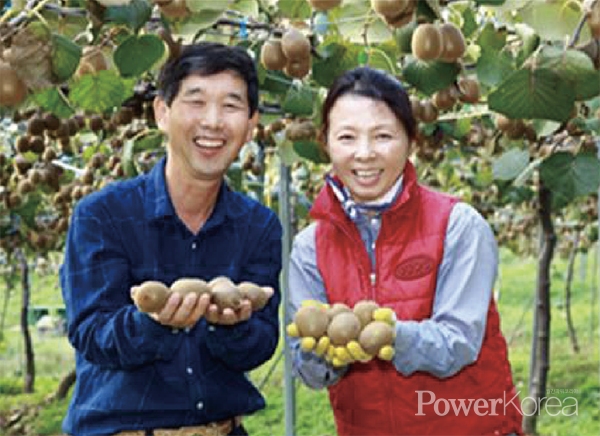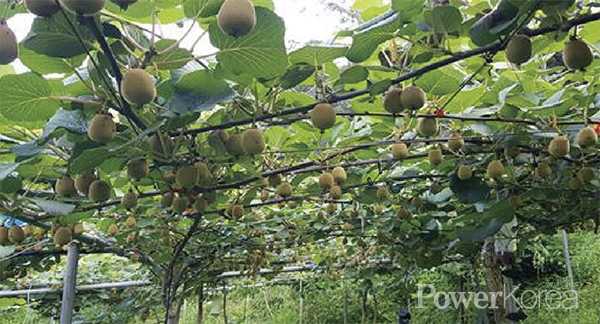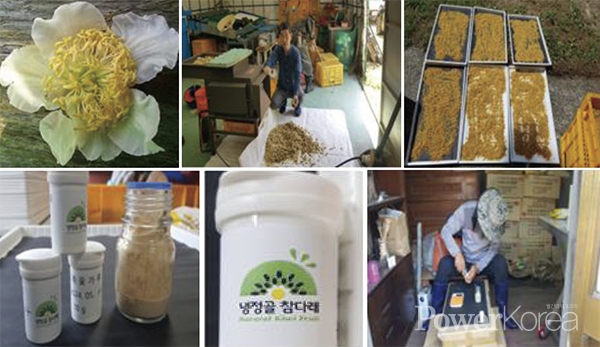 |
||
Kiwi is a fruit that thrives in warm regions, and is mainly grown on Jeju Island and the southern coast of Korea. Gimhae, in particular, is an area where kiwi cultivation is expanding, and the city is providing support to foster it as a local crop.
 |
Selected as the first agricultural master in Gimhae by the Ministry of Agriculture, Food and Rural Affairs
“I grew up watching my parents farm, and when I was working, I would go to the farm every weekend and grow kiwis, and it worked out so well that I started doing it full time.” says Naengjeonggol Kiwi CEO Han Chang-ju. He has been growing kiwis since 1992 and is a graduate of Pusan National University’s Agriculture CEO Course. His efforts were recognized by being selected as the first agricultural master in Gimhae by the Ministry of Agriculture, Food and Rural Affairs. The Agricultural Meister is the highest authority in agriculture and is awarded to those who can demonstrate creative practices in agriculture, and is aimed at the next generation of farmers and professionals with creative ideas and differentiated management skills. It is open to farmers with at least 15 years of farming experience or who are recognized as having such skills. The first written test measures expertise in cultivation technology, agricultural management, and teaching methods; the second in-depth interview evaluates core competencies such as product expertise and teaching ability; and the third on-site visit to the candidate’s farm examines management practices and technology transfer plans. This year, 31 people were selected including 8 in Gyeongnam of which CEO Han Chang-ju is the only one from Gimhae.
 |
Kiwis grown in rich sunshine and high temperature difference
He grows 6 to 8 tons of green (20%), gold (60%), and red (20%) varieties annually on 5,000 square meters in Buk-dong, Gimhae, and 2,855 square meters in Hallim-myeon. He has invested heavily in fruit sorters, tracked transporters, pot pickers, power weeders, irrigation systems, sugar meters, durometers, and magnifiers, and is growing kiwis that average 3-5 brix higher than the typical 12-13 brix kiwi. Growing a kiwi requires artificial pollination, pollen collection, powder pollination, water pollination, bud picking, fruit picking, and pruning. “You have to pick and plant a good variety of kiwi, and it’s very important to know the characteristics of the variety and have the skills to propagate it yourself.” says Han.
 |
Rich in vitamin C
Kiwis are nutritionally dense, containing many natural nutrients, including vitamin C, vitamin A, folate (vitamin B9), calcium, potassium, polyphenols, and dietary fiber. The insoluble fiber in kiwis helps to excrete waste from the intestines, which improves constipation, eliminates toxin buildup, and prevents the appearance of age spots, blemishes, and freckles. Kiwis are low in fat and sodium and high in fiber, which promotes intestinal peristalsis, makes it a popular fruit for dieters. The vitamin C content of kiwis grown here is seven times that of grapes and nine times that of apples, which helps boost immunity and manage stress. He is certified in GAP and low-carbon agricultural products, as well as a horticultural technician and urban agriculture manager. He does not use any herbicides and over 90% of his kiwis are now supplied to all schools in Gimhae.
김태인 기자 red3955@hanmail.net







